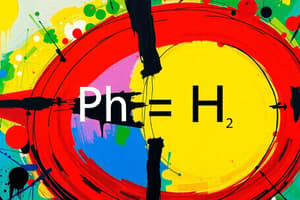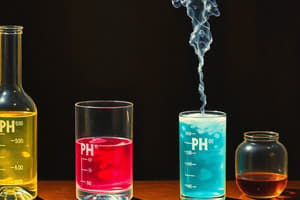Podcast
Questions and Answers
Which characteristic distinguishes strong acids from weak acids?
Which characteristic distinguishes strong acids from weak acids?
- Strong acids have a high pH
- Weak acids partially dissociate in water (correct)
- Weak acids produce a high concentration of H+ ions
- Strong acids partially dissociate in water
Which of these compounds is an example of an alkali?
Which of these compounds is an example of an alkali?
- NH3
- CH3COOH
- H2O
- NaOH (correct)
Which statement correctly describes the nature of pH indicators?
Which statement correctly describes the nature of pH indicators?
- They neutralize acids and bases.
- They remain the same color regardless of pH changes.
- They change color in response to specific pH changes. (correct)
- They dissolve completely in water.
Why does a strong base like NaOH significantly alter the pH of a solution?
Why does a strong base like NaOH significantly alter the pH of a solution?
Which acid only partially dissociates in water?
Which acid only partially dissociates in water?
What pH value would you expect for a neutral solution?
What pH value would you expect for a neutral solution?
Which of the following is an example of a strong acid?
Which of the following is an example of a strong acid?
Flashcards are hidden until you start studying
Study Notes
Acids, Bases, and Salts
Strong and Weak Acids
- Strong acids:
- Completely dissociate in water to produce H+ ions
- Examples: HCl, HNO3, H2SO4, HClO4
- High concentration of H+ ions, resulting in a low pH
- Weak acids:
- Partially dissociate in water to produce H+ ions
- Examples: CH3COOH, HCO3-, H2CO3
- Low concentration of H+ ions, resulting in a higher pH
pH Calculation
- pH = -log[H+]
- pH scale: 0-14
- Acidic: pH < 7
- Neutral: pH = 7
- Basic: pH > 7
- pH calculation examples:
- If [H+] = 0.01 M, pH = -log(0.01) = 2
- If [H+] = 1 x 10^-5 M, pH = -log(1 x 10^-5) = 5
Alkalis and Bases
- Alkalis:
- Soluble bases that contain the hydroxide (OH-) ion
- Examples: NaOH, KOH, Ca(OH)2
- Strong bases, completely dissociate in water to produce OH- ions
- Bases:
- Accept H+ ions to form a conjugate acid
- Examples: NH3, H2O, CO3^2-
- Can be strong or weak, depending on the extent of dissociation
Indicators
- pH indicators:
- Substances that change color in response to changes in pH
- Examples: litmus, phenolphthalein, methyl orange
- Used to determine the pH of a solution
- Acid-base indicators:
- Substances that change color in response to the presence of acidic or basic substances
- Examples: bromothymol blue, Congo red
- Used to determine the presence of acids or bases in a solution
Acids, Bases, and Salts
Strong and Weak Acids
- Strong acids completely dissociate in water to produce H+ ions, resulting in a high concentration of H+ ions and a low pH.
- Examples of strong acids include HCl, HNO3, H2SO4, and HClO4.
- Weak acids partially dissociate in water to produce H+ ions, resulting in a low concentration of H+ ions and a higher pH.
- Examples of weak acids include CH3COOH, HCO3-, and H2CO3.
pH Calculation
- pH is calculated using the formula pH = -log[H+].
- The pH scale ranges from 0-14, with acidic solutions having a pH < 7, neutral solutions having a pH = 7, and basic solutions having a pH > 7.
- Examples of pH calculations include:
- If [H+] = 0.01 M, pH = -log(0.01) = 2.
- If [H+] = 1 x 10^-5 M, pH = -log(1 x 10^-5) = 5.
Alkalis and Bases
- Alkalis are soluble bases that contain the hydroxide (OH-) ion and completely dissociate in water to produce OH- ions.
- Examples of alkalis include NaOH, KOH, and Ca(OH)2.
- Bases are substances that accept H+ ions to form a conjugate acid.
- Examples of bases include NH3, H2O, and CO3^2-.
- Bases can be strong or weak, depending on the extent of dissociation.
Indicators
- pH indicators are substances that change color in response to changes in pH, used to determine the pH of a solution.
- Examples of pH indicators include litmus, phenolphthalein, and methyl orange.
- Acid-base indicators are substances that change color in response to the presence of acidic or basic substances, used to determine the presence of acids or bases in a solution.
- Examples of acid-base indicators include bromothymol blue and Congo red.
Studying That Suits You
Use AI to generate personalized quizzes and flashcards to suit your learning preferences.




